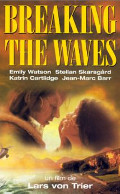
Directed by
Lars Von Trier
154 minutes
Rated R
Reviewed by
Bernard Hemingway

Breaking The Waves
The first English-language film by Danish director Lars von Trier and a winner of the Grand Jury Prize at Cannes, Breaking The Waves is much praised by art cinema cognoscenti but whilst earning credit for its commitment to what would eventually become formalized as the Dogme 95 aesthetic (roughly, cinematic honesty), in most other departments it is a long-winded and, some might say, self-indulgent, tract that frustrates sympathy more than earns it.
It tells the story, broken into chapters, of the unswerving, somewhat unhinged, religious faith of Bess (Emily Watson), a young woman who belongs to a dour Calvinist sect living on a remote Scottish island near the North Sea oil fields in the early 1970s. She marries an oil-rig worker (Stellan Skarsgård) who gets seriously injured and is hospitalized, the core of the film being about Bess's commitment to saving her husband despite the negative views of her approach by all around her .
This is the intriguing aspect of the film but von Trier's realist style (it is shot exclusively with a hand-held camera by Robby Muller) and labouring of his narrative works against the story's conceptual and emotional efficacy. Thus one wonders how and why hard-drinking Jan ever married Bess in the first-place and why his literally miraculous recovery elicits no comment from anyone, whilst the Dennis Potterish idea, developed at some length, that he becomes some kind of pervert dragging her down into a slough of moral turpitude (which she takes to with holy fervour) is, at best, approximately handled.
Portraying "childlike" characters is always a difficult task for adults and whilst Emily Watson, a Royal Shakespeare Company actress in her film debut who has gone on to give us many first class preformances, is often effective, she sometimes tends to resemble an overgrown Shirley Temple (she also often looks like Sarah Miles in Ryan's Daughter, 1970, a film which has some some affinities with this) and von Trier simply gives us too much of her. The result is that the annoyance at her eventually expressed by her devoted sister-in-law, Dodo (Katrin Cartlidge, herself over-given to glowering), is too much felt by the audience who are subjected to over two and a half trying hours of her simple-minded shenanigans.
Want something different?





